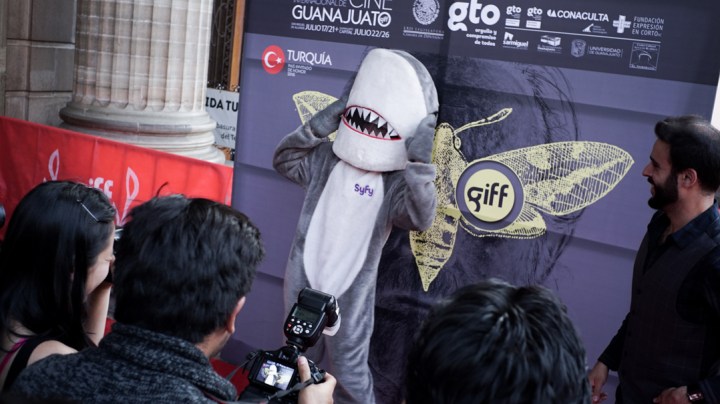Wednesday, July 22
Vanessa: Since the festival basically starts anew in Guanajuato, there was an opening ceremony in which Festival Director/Founder Sarah Hoch gave a brazen speech about the state of Mexican cinema, “Dicen que no hay públicos, pero yo me atrevo a contradecir eso, porque si no los hubiera no tendríamos ahora más de 100 festivales de cine en México, no dos ni tres como hace 15 años.” She went on to lambast Mexico’s cultural institutions, government, and film industry for the lack of support for national cinema and ended with the festival’s refrain, “Mas cine por favor!” I spent the rest of the day watching Mexican short films including La Ausencia, an intimate doc directed by Arturo Baltazar, about an elderly woman who is determined to celebrate and have fun on her birthday even if her family doesn’t show up.
Afterwards, two of my favorite documentaries of GIFF were screened in the same program, bringing together stories about the unfathomable pain a mother goes through when a child has been disappeared. In Tatiana Huezo’s follow up to El lugar mas pequeno, her award-winning, globe-trotting opera prima — the short Ausencias sticks to her unique audio-visual style, where she records interviews separately from the image and we never see the subject actually speaking. The profoundly moving Ausencias allows Lulu, a woman whose husband and son were kidnapped in Mexico five years ago, tell her story. After the short was the feature documentary, Tiempo Suspendido, in which the director, Natalia Bruschten, shares her grandmother’s struggle with dementia and memory loss. Once a vibrant activist and part of the Madres de Plaza de Mayo, Laura Bonaparte even sued the Argentine government for the disappearance of three of her children during the dictatorship. Now in her eighties, she barely remembers their names. It makes you wonder if her inability to remember those painful experiences is a blessing or a curse?
Then, there was (another) opening night party, of course. It rained a lot and we were under a tent which gave me flashbacks to that wedding video that’s been circulating on YouTube of when a white tent collapses on the guests during a storm. I was half scared, half didn’t care because of the free beer.
Andrew: The day kicked off with the inaugural ceremony. Yes, that’s a second inauguration — this time for the Guanajuato capital leg of the festival. The whole thing definitely feels a lot bigger now: more glitz, glamour, red carpets and all that. The inaugural screening was a series of short documentaries made by local university students who weren’t necessarily experienced with film production. The topic: Identidad y Pertenencia, and the results were an interesting panorama of life in the towns and cities of Guanajuato. Standouts included El Guardian about a mystical site of volcanos and craters that according to local folklore provides protective energy to all of Guanajuato. Then there was Sin Polvo: a fascinating character study of a clown struggling with personal demons. Everything closed out with the bombo y platillo of a Banda de pueblo from a nearby town who got the whole auditorium skippin’ and jumpin.’
On my way back to the press headquarters at the picturesque University of Guanajuato I ran into my roommate (who happens to be the red carpet coordinator for the festival), and he invited me to take a backstage peek at the the preparations for “Project Glamour” – a special event in which a select group of celebrities and otherwise important cultural figures would be dressed for the red carpet by Mexican fashion designers. Lots of hairspray and flowery jackets ensued, but it was cool to get a first hand look at the great work Mexican designers are doing outside of the traditional centers of Milan, New York, etc.

Cut to a very stormy red carpet. After the whole rain-soaked spectacle wrapped up, we headed over to the inauguration party and were greeted by a Cumbia karaoke version of a Maroon 5 song (they all kinda sound the same to me) by a cover band seemingly teleported in time from 1980s Miami. Thus far the parties have been sorely lacking in the salsa/reggaetón dept — I mean, cumbia’s great, but you gotta mix it up a little more — so out of boredom I took the opportunity to compulsively photograph everything I saw. Photos forthcoming.
